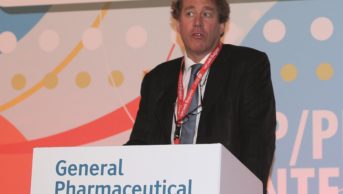
Getty Images
Professionalism. This was the buzzword at the 2014 Royal Pharmaceutical Society (RPS) annual conference, held in Birmingham on 7 September to 8 September 2014. The theme of professionalism in pharmacy was explored by speakers and participants in many contexts, including education, research and practice.
In a keynote presentation, General Pharmaceutical Council chairman Nigel Clarke said it was “quite wrong” that there are pharmacists out there who do not believe they should be part of the professional body, the RPS.
It could be argued he was preaching to the converted, given that the statement was made at the RPS’s flagship event to an applauding audience. However, there was a substantial backlash from his remarks on the microblogging platform Twitter. Whatever your view, it is not fair to conclude that people who have chosen not to join the RPS are by definition unprofessional — any more than one can say that the moment you have paid the membership fee you are mystically imbued with all the qualities of professionalism.
To clarify Clarke’s statement, he said that the best way to protect patients and improve quality of care is to support and encourage professionalism. He also suggested that pharmacists should spread the word that membership of the RPS “is something expected of them by the public”.
The Pharmaceutical Journal would recognise that pharmacy is entering a new era in terms of professional identity. As their roles expand, pharmacists must be encouraged to look beyond the minimum requirements of registration, to consider their own growth as professionals and how this resonates with their own ideas about professionalism.
Several developments bring this into focus.
One of these is the recent announcement of changes to clinical academic research funding in England. The revamped process, managed jointly by the National Institute for Health Research (NIHR) and Health Education England (HEE), opens up the full clinical academic career pathway to pharmacists. Training opportunities will now be available at five levels: internship, master, clinical doctoral research fellowship, clinical lectureship and senior clinical lectureship. This is a welcome move that puts pharmacists in England in a strong position to bid for training monies to develop as clinical academic practitioners.
For the first time, pharmacists became eligible to apply for NIHR/HEE funding at master and PhD level earlier this year. A number of pharmacists have been accepted on to the master’s programme this time around; in the PhD selection process, which is under way, more than 10% of the applications came from pharmacists. The scheme will support the advancement of a relatively small cohort of pharmacists each year, but the benefits for pharmacy as a profession should not be understated.
The scheme complements the RPS’s aspirations for pharmacists to be “research active”. A draft strategy from HEE used the term “receptive to research and innovation”. In response to feedback, the special health authority now uses the expression “engaged and actively participating”.
Having an NHS workforce that has opportunities to develop clinical academic capabilities will pay dividends in terms of staff retention in the health service, career satisfaction and care quality. It should also help to inspire future generations of healthcare professionals.
Meanwhile, widespread development of pharmacist roles is proposed for Scotland as part of the ambitious pharmaceutical care plan ‘Prescription for Excellence’. The system-wide plan suggests that all pharmacists in Scotland will be accredited as independent prescribers by 2023. This would require a massive effort to up-skill the existing pharmacy workforce. Many pharmacists will have cause to rethink their professional outlook. Workforce pressures, for example, may make it difficult for some pharmacists to think beyond the current demands of the day job and consider how they might further develop their knowledge and skills.
At the RPS conference, chief pharmaceutical officer for Scotland, Bill Scott, said the RPS Faculty could play an important role in supporting pharmacists to meet the goals of ‘Prescription for Excellence’, so it is positive that the professional recognition programme continues its roll-out. In 2015, the Faculty will open its assessment process to pharmacists with two to ten years of experience. This expansion of the programme will provide a boost for pharmacists who are seeking to be recognised for their achievements at this stage in their careers.
Each of these developments has the potential to improve the standing of pharmacy as a profession and have direct impact on the future of pharmacist roles and range of professional opportunities. They do not, however, ensure professionalism.
Organisations can do much to foster a culture of professionalism among their employees. Leaders can inspire by example. But it is essential that individual pharmacists reflect on how their commitment to learning and development forms part of their own professionalism.


